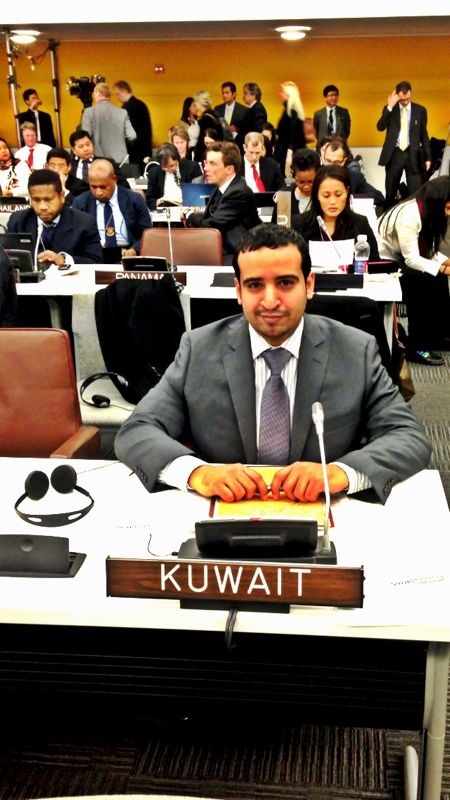LOC10:26
07:26 GMT
 Kuwait's Second Secretary Abdul-Aziz Ammash Al-Ajmi
Kuwait's Second Secretary Abdul-Aziz Ammash Al-Ajmi
(with photo)
UNITED NATIONS, April 3 (KUNA) -- Kuwait, a State that produces no deadly
arms, has endorsed international treaties for non-proliferation of lethal and
nuclear weapons for it "believes that power lies in human resources and
existence, rather than, extinction of the human race."
"The State of Kuwait, which does not manufacture various types of arms, has
joined such treaties and accords out of its belief that power lies in the
human resources and the existence of man, not his extinction, and for sake of
making the world free of weapons of mass destruction namely nuclear arms, as
well with the aim of shifting financial resources toward economic, social,
humane and political development," affirmed Kuwait's Second Secretary
Abdul-Aziz Ammash Al-Ajmi, addressing the UN Disarmament Commission during the
2013 session.
The Gulf State has signed and endorsed the Nuclear Non-Proliferation Treaty
(NPT), The Comprehensive Nuclear-Test-Ban Treaty (CTBT), the Convention on
Early Notification of a Nuclear Accident, The Comprehensive Nuclear-Test-Ban
Treaty and the Additional Protocol to the Treaty.
The treaties and conventions, namely the NPT, are crucial for limiting
hazards and threats caused by these lethal arms, Al-Ajmi said. However, he
pointed out that implementation of this treaty "must be balanced and cover all
aspects, namely the ones that affirm states' non-controversial right for
conducting researches and studies and acquiring nuclear technology for
peaceful purposes, in line with the Safeguards' Regime of the International
Atomic Energy Agency (IAEA)."
The Middle East region suffers from protracted challenges that have
hindered implementation of development strategies and cooperation among
nations of the region and the world, he said, adding that it is also prevailed
with unstable economic and political conditions "due to the lack of confidence
resulting from Israel's possession of weapons of mass destruction in defiance
of resolutions of the international legitimacy that call for joining the
treaty, banning nuclear proliferation and subjecting all nuclear installations
to the IAEA Safeguards' Regime," the Kuwaiti diplomat elaborated in his
address at the international quarter, shedding light on the nuclear problems
in the region.
Al-Ajmi expressed regret for aborting efforts for holding a convention in
Finland, in 2012, to proclaim the Middle East a region free of such weapons,
expressing hope that further effort be exerted in this regard to rid the
region of looming lethal dangers resulting from stockpiles of these deadly
weapons. Moreover, he regretted failure to reach consensus among the UN member
states on endorsement of a new convention regarding arms trade, last Thursday.
The relevant states referred it to the General Assembly, on Tuesday, where
it was approved unanimously. But Al-Ajmi also regretted that the final text
did not include Arab proposals, presented by the State of Kuwait last March --
in its capacity as the head of the Arab Group. These proposals would have
rendered the convention more balanced and much more effective in "putting an
end to the humane suffering caused by transfer and trade of conventional
weapons."
He re-affirmed Kuwait's belief in the UN as an international organization
keen on safeguarding world peace and security, but re-stressed that such
lethal arms remained a serious threat to mankind survival and well-being. He
also stressed anew Kuwait's determination to back any effort aimed at
containing dangers of these arms. (end)
sj.rk
KUNA 031026 Apr 13NNNN